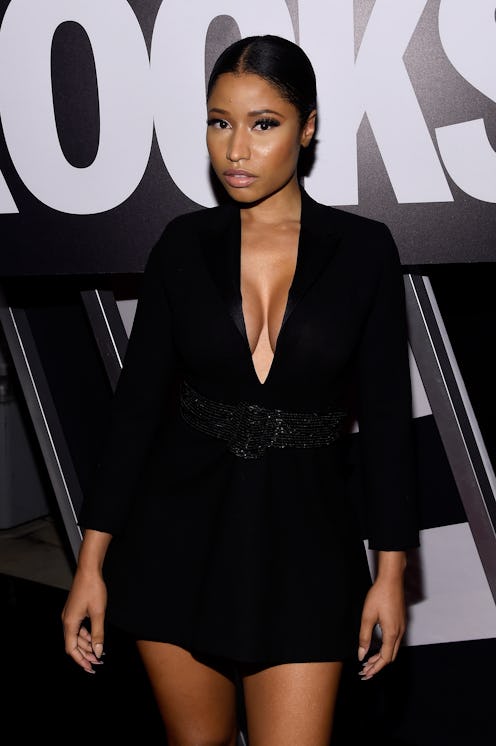Just as you probably do, Nicki Minaj thinks the state of social justice in America is pretty bleak right now. In her latest Rolling Stone interview, Nicki Minaj talks about black artists speaking out for social justice, the general feeling of hopelessness in the black community, and Eric Garner.
The interview isn't published in full online, but Rolling Stone has teased it with a few excerpts leading up to its Friday, Jan. 2 release. Other than talking about the abortion alluded to in her song "All Things Go," and opening up about being pro-choice, Minaj gives her perspective on the unfortunate racial inequality in America that has been making many headlines as of late. She told Rolling Stone:
I feel like when Public Enemy was doing "Fight The Power," we as a culture had more power. Now, it just feels hopeless.
When asked about the chokehold killing of Eric Garner, Minaj said,
It's sickening, and I've been reading so many people saying, "Why are we surprised?" That's what's really sad: that we should somehow be used to being treated like animals...It's gotten to the point where people feel like there's no accountability: If you are law enforcement and you do something to a black person, you can get away with it.
Over the past few months, numerous artists within the hip hop/ entertainment communities including Minaj have spoken out about Eric Garner and Mike Brown via social media. However, using the example of Kanye West (in the "George Bush doesn't care about black people" incident of '05), she explains that the world is a hostile place for black artists who speak candidly about racism. She says:
People say, "Why aren't black celebrities speaking out more?" But look what happened to Kanye when he spoke out. People told him to apologize to Bush! He was the unofficial spokesman for hip-hop, and he got torn apart... And now you haven't heard him speaking about these last couple things, and it's sad. Because how many times can you be made to feel horrible for caring about your people before you say, "F--k it, it's not worth it, let me live my life because I'm rich, and why should I give a f--k?"
Minaj makes a salient point with the Kanye example. Being forced to recant a bold statement of truth is obviously demoralizing. Having a radical public voice, attempting to use it, and then being lambasted for doing so is enough to drive people into silence. This sort of negative example will only breed more silence, feelings of hopelessness, and keep things the way they are.
Luckily, the media of 2005 and the media of 2014 are vastly different. Social media and the blogosphere have opened up the way that people discuss social justice. While certain outlets of the mainstream media may not support the political statements of powerful black people, many members of the public will support their actions by sounding off on the Internet. Dialogues are more open and egalitarian than they've ever been, and we can use that to change culture if enough people (especially cultural icons) speak out. Perhaps, things aren't quite as bleak — at least when it comes to the need for apprehension on speaking out — as Minaj seems to think.
I know that recent events have left morale bruised, but I think viewing the situation as hopeless will lead us to cultural stagnation. The first step to social change is identifying the various things that culture does do to keep those who control society at the top. Publicly humiliating those who try to incite change is one of them, as Minaj identifies with the Kanye example. But ultimately, action — whether it comes in the form of a guerrilla statement on TV, going to a protest, tweeting, or sending food to demonstrators — must happen if we can hope for any change.
Images: Getty Images
